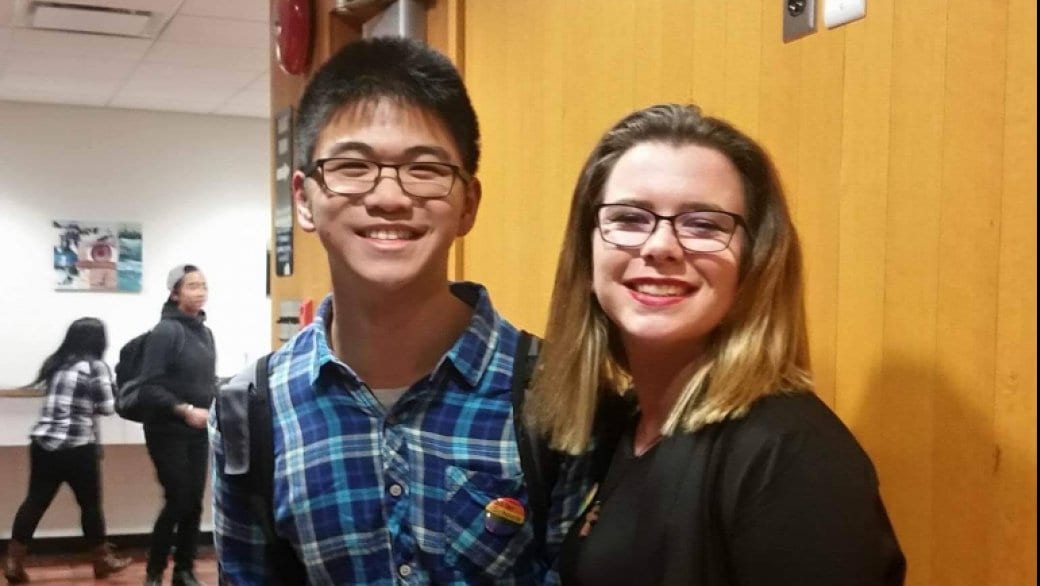For a moment, Nathan Lee thought the Richmond school board wasn’t going to take his advice.
Then the board’s trustees voted to support LGBT students in their Vancouver suburb by creating a new, stand-alone sexual orientation and gender identity (SOGI) policy on Feb 20, 2017.
“Honestly, it felt amazing,” Lee says. “I was slightly surprised. I didn’t think that in Richmond, BC, in our socially-conservative city, that our school board would be open to it.”
Lee, who runs Steveston-London Secondary School’s Rainbow Club, says life as a queer student at his high school is traumatic. Younger students don’t feel safe in an environment where lockers are vandalized with slurs, he says.
He particularly remembers the time a substitute teacher suggested conversion therapy to Rainbow Club members. Now discredited, conversion therapy aims to cure people of their gayness.
“This teacher proceeded to make some very hurtful remarks suggesting that we all search up a leading conversion-therapy advocate, and also suggested to one of my members that same-sex relationships were not okay,” Lee recalls.
If a policy educating teachers, staff and students had already been in place, this may never have happened, he says.
That’s why he and a recent Richmond graduate, Kaylyn Munro, petitioned their school board last November to urge trustees to introduce a new policy that specifically educates district members about sexual orientation and gender identity in their schools.
Richmond’s superintendent, Sherry Elwood, agrees that it’s important to have such a policy, not only to support students and staff within schools, but to prepare all students to act positively in the world. “More importantly, all of our students, including SOGI students, need to feel supported inside of their school environment and within the school culture that they live in.”
Still, Elwood doesn’t expect the policy to be developed until this fall at the earliest.
“In the case of big-picture issues like this particular one, your best practice is to do it thoughtfully and to take the time needed,” Elwood suggests.
James Chamberlain, a vice-principal in Vancouver and a longtime gay-education activist, says Richmond’s SOGI policy is already overdue.
Richmond has been “non-existent in terms of any leadership whatsoever on LGBTQ issues,” says Chamberlain, who started his teaching career in that school district in 1992. He hopes the policy will bring changes to curriculum, educate students and parents, provide resources to teachers and increase support and counselling for students.
As Richmond begins work on its new stand-alone LGBT policy, the district has yet to comply with an order from the provincial government to add explicit protection for LGBT students to its existing anti-bullying policy.
Richmond missed the Dec 31, 2016, deadline set last September by the BC minister of education, Mike Bernier.
Richmond school board trustee Debbie Tablotney says the school board started revising its existing code of conduct in 2015 to add new language to protect students and staff from discrimination based on sexual orientation and gender identity, consistent with the language in the BC Human Rights Code. But, she says, these changes take time.
“Policy is not done overnight, and you don’t want it done overnight, because you want it to be right and to be there to guide you. It’s important to really be careful,” Tablotney adds.
“We’ve made the change,” she says. “It’s just the actual final approval of the document that we’re seeking.”
Tablotney hopes the board will approve the changes to the code of conduct by June 30.
As for the new, stand-alone policy, Tablotney says it would add an extra layer to the government-required protection from discrimination — focusing specifically on “education and awareness and understanding.”
But discussion of both the stand-alone policy and the mandated policy update has not been without controversy.
According to Global News, a group called Parents Care publicly voiced concerns that a SOGI policy might convert straight students. “It is possible. If it’s a life choice, it is possible,” Parents Care group member Colleen Howu told Global News.
Lee says one opponent also claimed at the Feb 20 school board meeting that the policy would alienate Muslim refugees. “Come on, stop blaming others,” he counters, dismissing the claim. “Stop hiding your own bigotry and hate by blaming some other culture — like really?”
Chamberlain also rejects the “faith-based or cultural-values” argument, saying it “doesn’t hold water” in public schools in 2017. “People can believe whatever they want to in their homes, but schools need to be accepting of LGBTQ students,” he insists. “It’s time for change.”
“There will always be people who are opposed to SOGI policies but in this day and age, they are the minority, and human rights and safety for every student are not negotiable,” he says.
Xtra’s attempts to reach members of the Parents Care group to request comment were unsuccessful.
The next step for the stand-alone SOGI policy is public consultation.

 Why you can trust Xtra
Why you can trust Xtra


